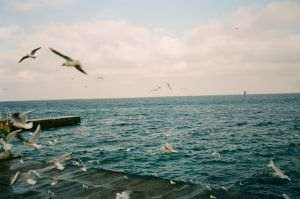I've been reading for a while the press release of the SAR about "the Launch of the Coalition for a Clean Mass Media (CPC)" and I just can't get myself to tackle the subject, because I can't make up my mind on how to come at it - head on or from behind?
I'll have a go at it head-on.
As a principle, the initiative feels just like the ad for the Rom chocolate, such as, for instance, the one where it had an ad which said "we are tired of picking other people's strawberries" and as a result, in the ad Romanians would get even by getting the foreigners to milk their cows.
The shared principle of the ad in question and of this campaign that I am speaking about is the fact that they are both invoking real aspects, but they are drawing conclusions worthy of a redneck.
The difference is that in the case of the Rom chocolate, the idiotic nature of the conclusion is deliberate, making a mockery of a Romanian frustration; since that frustration is in fact justified, the intention of the ad to make fun of it is disgusting, which is something that we have come to expect to from the agency that handles those campaigns.
But in the case of the "Coalition for a Clean Press", the idiotic nature of the initiative is involuntary.
I will not go through with doing the things that it requests me to do.
I will not publish on my website the information they are requesting of me.
I own 100% of the BURSA newspaper; its publishing company has no debts towards the state budget and never did, just like it has no other debts and it has never borrowed or been financed by external entities (it is self-financed); the publishing house was profitable last year.
I wouldn't disclose my top 20 advertisers if someone held a gun to my head - that is trade information - those people aren't stupid to ask, but I would be stupid to answer (I'm actually curious, who told them to ask that question and why wouldn't they ask to see the whole list of advertisers anyway?!).
I will not publish any such information on the BURSA website.
They can go ahead and include me among the "non-transparent" media entities - does that mean that BURSA isn't doing "clean journalism"?
How do they get to that conclusion anyway?!
Who are they to ask me to do something like that?!
Did they post the media entities they are involved in on their websites?
Let me give you an example of "clean press" entities that are part of the "Coalition for a Clean Press": how independent can Ioana Avădani, the executive director of the "Center for Independent Journalism", be, when she is a shareholder of Mediafax SA, a company that belongs to the Mediafax group?
How can she request to know "the historical debts to the state budget" of other press entities, when, as a shareholder, she knows herself that the group she is a part of has historical debts of millions and millions of Euros?!
How sincere is the concern of Ioana Avădani for "independent journalism", knowing the prevalence of the barter between politicians and the media entities, in which the latter are constantly rewarded by having their huge debts to the state budget tolerated, or cancelled, and even by having those entities that have such debts be rewarded with huge subsidies?!
Say what?!
Ioana Avădani is going to rank BURSA among the "nontransparent"?
Ha, ha!
Perhaps Mrs. Ioana Avădani should worry about her own lack of transparency first, if possible!
By the way, Mrs. Avădani, aren't you in a bit of a conflict of interest yourself?
But, like Victor Ponta said, let's leave "poor" Avădani to her "independence".
Yes, the Coalition is saying the truth, yes, our press is on its knees, which is how the most abject humiliations begin.
But you can't go from that to the conclusion that "In Romania it is a good thing to know who is paying the money to be able to judge the content", like Alina Mungiu Pippidi superficially does.
That would make sense if there existed a natural or social law which states that money produces articles directly.
As if this text were the result of ink, instead of my ideas.
As far as I remember, Mrs. Pippidi has worked in the printed press; madam, have you ever encountered a case where money generated "content"?; wasn't there something else around, someone employed as a "journalist" that had to exist for the content to appear?
"Ah!, of course", you are going to say, "but this is obvious, why nitpick!"
Well, my dear lady, this is a nitpick that illustrates your superficial thinking.
The employee called a "journalist" is the link between the money and the "content".
And we only now note the reality of the problem: is that an "employee" or a "journalist"?
Because if they are "journalists", then they do not provide the "content" (as you so crudely put it, Mrs. Pippidi - "content" is for sausages), rather they express their ideas and feelings, journalists express themselves, and no money can buy that.
Order a journalist to write something against or in favor of Băsescu; they will look at you confused, it would take them a bit to understand that they are being mistaken for something else, for a clerk.
It's only clerks that fill newspapers, TV shows, radios and sausages with "content".
Clerks have no hesitations: "Boss, how do you want the article to be, critical or laudatory?"
Therefore, the main issue of the press is that it has no journalists, only clerks.
Let's imagine that financing has become transparent all across the Romanian press, that we know what interests each media institution serves, perhaps even that the professional association and the executives are showing admirable restraint in telling the journalists who to attack and who to praise in their articles.
So what?!
The clerks in the mass-media would have a serious problem: they would have to express their personality in writing.
And they wouldn't have any to express.
Didn't it use to be better when they had to ask "Boss, what do you want me to write?"
If it really were concerned with cleaning up the press, the "Coalition for a Clean Press" should examine all the contractual clauses of the journalists, rather then their financing sources.
Where the independence and the guarantees that journalists can express their own opinions aren't stipulated in his contract, there is no "clean press" either (in my opinion, there is no press either, because the definition of the press does not consist in broadcasting shows or in printing papers).
Just to reassure you: BURSA has these terms in its contracts.
I don't know anyone else who has them.
I, who own 100% of this newspaper, have been including this clause in the journalists' contracts for 15 years.
Do you understand what that means?
I wanted to make journalism, not write propaganda.
I don't need to specify that BURSA is "a clean newspaper", it is simply a newspaper.
None of my employees comes in to ask me "Should I praise that guy or bash him?"
If they did, I'd fire them.
• Press release - The Launch of the coalition for a Clean Press (CPC)
On May 22nd, the Academic Society for Romania (SAR), the Center for Independent Journalism (CJI) and Active Watch have launched the initiative of the Coalition for a Clean Press (CPC), a challenge addressed to making financing sources more transparent. The event was held at the Athenee Palace Hilton Hotel of Bucharest.
The launch was attended by Alina Mungiu Pippidi (President of the SAR), Ioana Avădani (Executive Director of CJI), Liana Ganea (Programs coordinator at Active Watch), as well as other representatives of the Civil Society, together with journalists and media experts who promised they would support the initiative. These include Moise Guran, Cătălin Tolontan, Petrişor Obae and Iulian Comănescu.
This action by the two organizations comes as a result of the fact that confidence in the Romanian media has fallen below the psychological level of 50%. "In the '90s - over 90% of the public trusted the press. Now, we've had people call out during protests: < < Let the press come over here so we can take off its leash > >. We are now dealing with the captive press. In Romania it is a good thing to know who is paying the money so you can evaluate the content", the president of the SAR further said.
The Clean Press initiative has five objectives, and most of them are focused precisely on increasing the transparency when it comes to its sources of funding, of which the first four can be implemented immediately. All the data requested by the CPC initiative is publicly available, but it is not easily accessible. The goal of this action is to have the public be informed about those who pay for the content and the potential conflicts of interest and even of ethics, such as the case of politicians that own media entities. That is why the initiators of this project are requesting that each media entity publish on its own website a set of information that includes:
- The ownership structure of the media entity
- The list of all the advertising clients that contribute more than 10% to the budget of the publication (the top 20 advertising customers ranked by size)
- Last year's balance sheet with the aggregated number of revenues/expenses
- Historical debts to the state budget.


















































